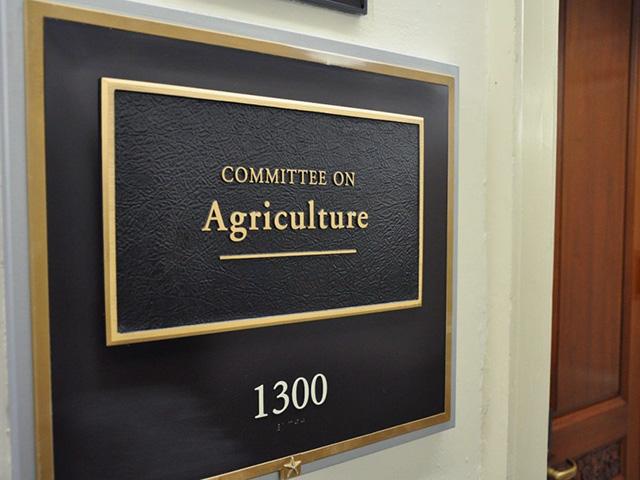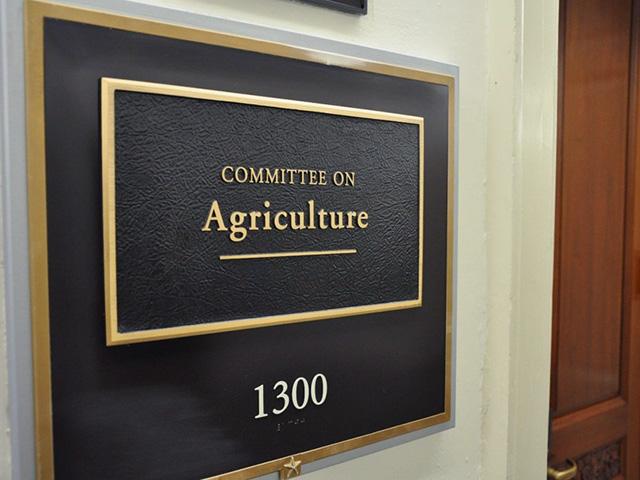Ag Policy Blog
House Ag Committee Farm Bill Markup Reflects New-Age Rancor and Leaves a Stain
Farm bills take years to develop and play out with policy and politics of the moment finally leading up to moments such as Thursday's markup in the House Agriculture Committee.
And at times it is hard to understand how lawmakers prepare for that moment but aren't willing to ensure they have done their best work when they walk out of that committee room.
My first big markup was in 2007 when Rep. Collin Peterson, D-Minn., led the House Ag Committee and Rep. Bob Goodlatte, R-Va., was ranking member. 1300 Longworth was packed over the three-day markup, as was the hallway and the overflow room down the hall. I remember watching Peterson and lobbyists from the meatpackers and National Farmers Union huddling in a room by themselves negotiating language over what essentially became the now-defunct country-of-origin labeling.
Peterson at that time actually dropped two separate proposals in committee -- a stripped-down farm bill and one that added $16 billion in spending. Again, the 2007 House markup took three days, but ended with Peterson and Goodlatte issuing a joint statement and each praising the bipartisanship involved in crafting the bill.
Thursday's farm-bill markup was a different ball game.
Technology allowed me, and as many as 1,500 other people, to geek out on farm policy watching the debate over the House Ag Committee's YouTube channel. Those numbers fell as the committee debate dragged into the night but there were about 400 people who hung in there to the end of the markup.
The key votes all fell along the party lines of 29 Republicans and 25 Democrats until the very end when four Democrats voted with Republicans to advance the bill. There was little to no effort to reconcile differences, just pushback all around.
The rancor from members on both sides was a lot more unbecoming compared to the bipartisanship that once carried the committee's work.
I guess that's just expected in the times in which we live. A lot of members don't appear to talk much across party lines at all but seem to relish sniping at one another over policy disagreements. Still, Chairman Glenn "GT" Thompson, R-Pa., noted multiple times there were 40 provisions in the bill that came from Democrats and another 100 or so provisions that had bi-partisan backing.
Here are a few thoughts from essentially 13 hours of must-see TV for farm-policy wonks:
-- The problem with Rep. Frank Lucas, R-Okla., is he's just too rational for today's Congress. The same probably goes for Rep. Jim Costa, D-Calif. A pair of the old lions on the committee, they pointed out a markup is still the early part of the process -- the first step in a long journey -- but both acknowledged a bill won't pass the floor without a bipartisan agreement.
P[L1] D[0x0] M[300x250] OOP[F] ADUNIT[] T[]
-- Democrats, overall, didn't come into the markup with multiple game plans to improve the bill. In nearly every amendment or change they offered, they were determined to try to pound the ball up the middle one time rather than offer multiple options. For example, Rep. Sanford Bishop, D-Ga., took the lead on an amendment to keep the Agriculture secretary's authority to use the Commodity Credit Corporation fund, rather than completely strip that authority so Thompson could use as much as $53 billion elsewhere in the bill for reference prices and crop insurance. Once Bishop's amendment failed on an expected 25-29 vote, Democrats were done. They had spoken for nearly an hour on all the other potential needs that could require USDA to use the fund, but they had no other amendment options to consider. They could have offered a secondary amendment that allowed the secretary some open latitude to use the CCC authority in cases of animal-disease emergency, or natural disaster, or to respond to a market disruption. Sanford and Rep. Nikki Budzinski, D-Ill., each had pointed out how the GOP plan for CCC could delay aid to producers when they needed it most. Still, Democrats had one amendment on the table, and when that was stopped, they were done.
And Democrats did this over and over again when it came to issues and funding cuts in the nutrition programs or keeping the climate-smart "guardrails" on conservation dollars rolled into the farm bill from the IRA. Once the Democrats' single amendment was blocked, they effectively surrendered that entire title of the farm bill.
In the end, Democrats actually gave up on their own chamber, which at one time in the not-so-distant past would have been a stunning move. Democrats repeatedly said they were counting on a better bill from Senate Agriculture Committee Chairwoman Debbie Stabenow, D-Mich., to save the bill. They didn't actually offer some of Stabenow's plans in their own markup, though, to debate in committee.
In the old days, a House Ag Committee member would have noted a member of the other party as an opponent, but the real enemy is the Senate. Not so much anymore.
CHILD LABOR'S BAD, BUT ...
The markup ended on a sad note that showed members of Congress can recognize a tragedy but choose not to act.
One of the more sickening trends in the meatpacking industry -- and other industries as well -- is the seemingly open disregard for child-labor laws. As the Department of Labor has reported, last year there were nearly 5,800 children working in violation of child-labor laws. That's an 88% increase uncovered in DOL investigations since just 2019.
Hundreds of kids have been found working in packing plants -- facilities filled with some of the sharpest cutting tools imaginable. Kids actually are working the overnight shifts -- when nobody is watching -- using chemicals and high-pressure power washers used to clean plants, their slick floors and their razor-sharp instruments. Even after investigations and a $1.5 million fine handed down against a Wisconsin company last year for employing more than 100 children, investigators earlier this year also found a Tennessee company had hired two dozen kids, some as young as 13 years old, to clean packing plants in Iowa and Virginia.
And some kids are getting hurt and dying.
The fact that kids are ending up working in packing plants is a complete failure by the administration and Congress. They don't want to deal with legal immigration even though we have a massive demand for labor in the country. So, companies are hiring migrant kids to do the work -- in violation of labor laws that go back nearly 100 years.
Rep. Greg Casar, D-Texas, a freshman, introduced an amendment late in the evening -- as they were debating the specific title to address these kinds of issues. Casar's amendment would require meatpackers with USDA contracts comply with enforcement of child-labor and minimum wage laws. Casar said his amendment would largely apply to the Big Four packers that have these contracts for USDA food purchases.
Everyone who spoke Thursday night insisted child labor at packing plants is appalling, but Republicans said there were unintended consequences over demanding enforcement of child-labor laws in the farm bill.
Now, we're talking about hundreds, maybe a few thousand children in a meatpacking industry that employs more than 500,000 people nationally.
Rep. Derrick Van Orden, R-Wis., another freshman, immediately introduced an amendment to supersede Casar's language. Van Orden's language called for a Government Accountability Office (GAO) report. Van Orden at one point suggested it's really not just the companies' faults because somehow the 13-year-old kids cleared E-Verify.
Rep. Dusty Johnson, R-S.D., called it "a complex amendment" that he didn't fully understand. He said that could increase the costs of school lunches or affect "hungry Americans."
Rep. Jim McGovern, D-Mass., said a GAO study "is a dodge" that means Congress doesn't want to deal with it.
Another congressman said it could affect small businesses and subcontractors. Rep. Kat Cammack, R-Fla., said the language was a "poison pill" for the entire bill "not germane" to the committee, even though Thompson said Casar's original bill was referred to the House Ag Committee.
"We can't even agree that child labor here is wrong. That's part of the problem," said Rep. Jahana Hayes, D-Conn.
In the end, the GOP won out in a party-line vote adding a GAO study.
Thompson indicated he would see about bringing in the secretaries of USDA and Labor to talk about these issues.
Child-labor abuses hurt the integrity of the entire meatpacking and livestock industries. Nobody should be willing to accept that this is happening in 2024. The time was late and lawmakers were cranky and wanted to wrap up, but that debate was a sad stain on the House Agriculture Committee and its work.
Also see, "GOP Members Hold Off Attempts to Amend Farm Bill in Late-Night Committee Vote," https://www.dtnpf.com/…
Chris Clayton can be reached at Chris.Clayton@dtn.com
Follow him on social platform X @ChrisClaytonDTN
(c) Copyright 2024 DTN, LLC. All rights reserved.





Comments
To comment, please Log In or Join our Community .